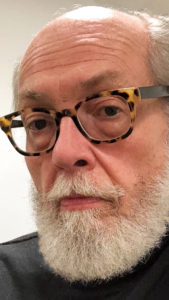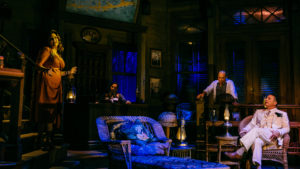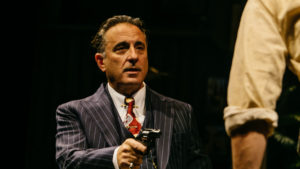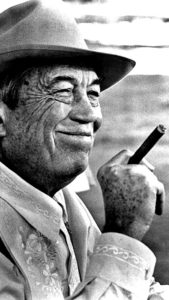John Huston’s 1948 film Key Largo is perhaps best remembered as the final on-screen pairing of Humphrey Bogart and Lauren Bacall. But there was something in this story that struck a nerve with Andy Garcia and writer Jeffrey Hatcher. Together they reworked the film (and the play on which it was based – more about that below) into a hit play running through December 15th at the Geffen Playhouse.
Maxwell Anderson, a Pulitzer Prize-winning writer and lyricist perhaps best known for Knickerbocker Holiday and Anne of a Thousand Days, wrote Key Largo the play. The show made its Broadway debut in 1939 and ran for just 105 performances. His Key Largo was set during the Spanish Civil War. John Huston re-worked the play to be a post-World War II crime drama film.
As I learned from my conversation last week with Hatcher, elements of both the play and the film found their way into Key Largo at the Geffen Playhouse. Here are edited excerpts from that talk.
How and why did an unsuccessful Broadway play become a film classic and a project that inspired you and Andy Garcia?

Both the film and the play have a virus – this horrible gangster. In the [Anderson] play it is Murillo but in ours it is Rocco (Garcia). If he doesn’t get stopped he will ruin everything he touches. There is also the character of McCloud (Danny Pino) who is disillusioned and has done bad things and feels himself a coward and he might kill himself. But he finds a second chance to redeem himself. Both say a lot about corruption, racism and both have a sense of what makes a juicy part.
Many of the changes found in your play stem from the changes Huston made. What did he get right with the film that you admired and what did Anderson get right with his play?
That’s interesting. The Huston film structurally is actually better for us than the play. The organization of the events is very streamlined. What Huston got right was that if you want to have a successful hero, you have to have a successful adversary. The Johnny Rocco they came up with is much more successful. In the original Murillo is much more vicious. Andy has speeches that come straight from the play, but he doesn’t have the braggadocio from the film. Huston got Gaye Dawn right (Claire Trevor won an Oscar for her performance; Joely Fisher plays the part in this play). That couple [she and Rocco] is really what makes the film somehow.

You told Playwrights Center in 2017 that “if you are dealing with lesser-known source material you have more leeway for creative license.” This is a beloved film, but it is also a very old film. Did Key Largo count as lesser-known source material?
It struck me that it did actually. Although I had seen it before, I knew vaguely the outlines of it, but it never impressed itself on my memory the same way Casablanca or The Big Sleep did. Some people call it noir, but it is lesser noir. The Bogart & Bacall pairing doesn’t have logically dramatic tension. There are some things they say to each other that don’t make sense. I think they really were coasting on their own image.
There are lines in the play that resonated as commentary on what’s going on in the world today – lines about truthfulness and loyalty. Is Key Largo making a commentary on how crazy things are now?
Only unconsciously really. We did talk about Trump in rehearsal, but really no. We were supposed to do the show next spring and everyone’s schedule changed and we moved it up – fast. Sometimes the zeitgeist is more about the subject matter. One of the reasons you are drawn to it may have to do with the zeitgeist of the world you are living in; you find the gems and they are highlighted by the present day.

There is a speech where Andy goes, “I’m always alone. I’m all by myself.” I think that was something he ad-libbed one day. You are aware of the way Trump repeats himself. How does that leech into your brain? Or is that the same rhetorical fallback of complete narcissists? We’ve been living in this bathwater for too many years, but perhaps this is the way we drain the bathtub.
As a writer who has adapted numerous projects for both films and stage, what is your priority in unlocking the best way to adapt for either form?
I tend to think that moment comes fairly early. I’m adapting Dial M For Murder (a play later turned into an Alfred Hitchcock film) for The Old Globe. It’s a pretty perfect script. Like any well-constructed play you fiddle with the structure at your own peril. If the idea is there in the first couple of days, great. If I have to sweat it through, I feel like I haven’t cracked it. Usually with a play it is understanding the setting.

John Huston once said, “I don’t try to guess what a million people will like. It’s hard enough to know what I like.” Does that sum up the writer’s challenge and do you feel the same way?
Because I’m in the theatre, I’m always aware of when [an audience] fidgets or laugh or not laugh. I wish I could be like that, but I’m clocking what they are doing. Certainly if you have a flop the studio won’t write you a check the next time!
All photos of Key Largo by Jeff Lorch/Courtesy of the Geffen Playhouse














